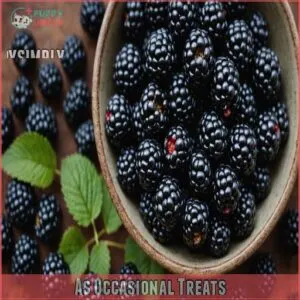This site is supported by our readers. We may earn a commission, at no cost to you, if you purchase through links.

Plus, their low-calorie content is great for your furry friend’s waistline.
Just don’t go overboard—stick to a handful for larger dogs and only a few for the little guys.
It’s like sharing a small fruit salad without the dressing!
Watch for any signs of tummy trouble, as too many can cause upset stomachs.
And remember, wild blackberries might be risky due to pesticides or chemicals.
Curious about other safe berries or the perfect serving sizes?
Stick around for tasty tips!
Table Of Contents
- Key Takeaways
- Are Blackberries Safe for Dogs?
- Benefits of Blackberries for Dogs
- Serving Blackberries to Your Dog
- Recommended Serving Sizes
- Potential Risks of Feeding Blackberries
- Other Berries Safe for Canine Consumption
- Berries Toxic to Dogs
- Tips for Feeding Blackberries to Your Dog
- Frequently Asked Questions (FAQs)
- Can dogs eat blackberries?
- Can one eat blackberries?
- How many blackberries can a dog eat a day?
- Are blackberries poisonous to dogs?
- Can dogs eat blackberry jam?
- Can dogs eat blackberry cobbler?
- Are blackberries toxic to dogs?
- What fruit can’t dogs eat?
- Why do dogs not like blackberries?
- Can dogs eat black raspberries?
- Can puppies eat blackberries?
- Blackberries: organic or conventional?
- Blackberry seeds: a problem for dogs?
- My dog has diabetes; can he eat them?
- Blackberry leaves: safe for dogs?
- Conclusion
Key Takeaways
- Blackberries are safe and healthy for dogs, offering vitamins, Omega-3 fatty acids, and fiber. Just remember moderation is key to avoiding stomach upset.
- Stick to a few blackberries as a treat, and always wash them thoroughly to prevent any pesticides or chemical risks, especially if they’re wild.
- Watch for any allergic reactions or tummy troubles, and always cut them into smaller pieces to prevent choking hazards, particularly for small dogs.
- Avoid giving blackberry jam or blackberry cobbler due to high sugar and potential harmful ingredients like xylitol. Keep treats simple and fresh.
Are Blackberries Safe for Dogs?
So, you’re wondering if those juicy blackberries are safe for your furry friend?
Generally, yes, blackberries are a healthy treat in moderation, offering vitamins and fiber, but always remember to watch for any tummy troubles.
Nutritional Benefits
Blackberries pack a punch in terms of canine nutrition.
They’re not just tasty but offer several benefits that keep your furry friend wagging.
Here’s why:
- Immune System Boost: Full of vitamins A, C, and E, they help fight off those pesky germs.
If you’re looking for safe and healthy options, you can check out the best blackberry treats dogs love here.
- Skin Health and Bone Strength: Vitamins in blackberries promote healthy skin and strong bones.
- Fiber Benefits: Help keep your dog’s digestion smooth and easy.
Plus, they’re a low-calorie treat!
Potential Risks
Though blackberries are generally safe for dogs, too many can lead to stomach upset.
These berries contain a hint of xylitol, and while it’s usually too little to cause trouble, don’t go overboard.
Watch for allergic reactions like vomiting or diarrhea—your pup might be saying, "No thanks!"
Remember, small dogs can choke more easily, so cut those berries into bite-sized pieces.
And steer clear of wild blackberries to avoid unexpected risks.
Benefits of Blackberries for Dogs
When you treat your dog to blackberries, you’re giving them a boost with essential vitamins and antioxidants.
These juicy berries are also low in calories and packed with fiber, making them a perfect snack for maintaining your dog’s health without overindulging.
Vitamins and Antioxidants
Adding blackberries to your dog’s diet is like giving them an immune-boosting superhero.
These little berries pack a punch with vitamins and antioxidants that promote coat health and support their overall well-being.
- Vitamin C: Helps fortify the immune system, making it your pup’s first line of defense.
- Vitamin K: Supports strong bones and helps prevent bleeding disorders.
- Vitamin E: Acts like a shield, protecting cells from damage and keeping skin healthy.
Fiber Content and Low-Calorie Treat
Just like vitamins pack a punch, the fiber content in blackberries supports your dog’s digestion.
These low-calorie treats are perfect for keeping your furry friend fit while satisfying their craving for something special.
They’re a tasty option, but they also help with calorie control.
So, next time you’re reaching for healthy snacks, consider this juicy treat for your dog’s diet.
Here’s a quick look at blackberry treats:
| Benefit | Dogs Love | How Often |
|---|---|---|
| Fiber Benefits | Yes | Daily Possibility |
| Low-Calorie | Absolutely | Moderation Key |
| Healthy Treats | Certainly | Training Special |
Serving Blackberries to Your Dog
When serving blackberries to your dog, it’s important to prepare them properly by washing and cutting them into smaller pieces to prevent choking hazards.
You can incorporate these juicy berries into meals or offer them as occasional treats, ensuring your furry friend’s snack time is both safe and enjoyable.
Preparation Methods
Now that we’ve covered the amazing benefits of blackberries for dogs, let’s talk about prepping them!
Before serving, always wash blackberries thoroughly.
Here’s how to prepare them safely:
- Wash them well.
- Cut larger berries into smaller pieces to prevent choking.
- Freeze them for a cool treat on a hot day.
- Blend them into a yummy smoothie (but avoid adding other ingredients your dog shouldn’t have!).
Remember, moderation is key when giving your furry friend these tasty treats.
Incorporating Into Meals
While your dog might ponder what delicious concoction you’ve prepared, blending blackberries into their meals provides a fruity boost without the fuss.
Pair them with lean meats for a gourmet touch or mix with kibble for added variety.
You can also find specialized blackberry dog snacks online, such as those at blackberry dog snack.
Keep the portions balanced to guarantee the nutritional benefits without overload.
Here’s a quick guide:
| Mix Idea | Main Ingredient | Add-in | Serving Frequency |
|---|---|---|---|
| Fruit Medley | Dog Kibble | Blackberries | Twice a week |
| Meat Medley | Lean Chicken | Blackberries | Once a week |
| Veggie Combo | Carrots | Blackberries | Twice a month |
| Yogurt Delight | Plain Yogurt | Blackberries | Weekly |
As Occasional Treats
When you’re rewarding your furry friend’s good behavior or marking a special occasion, blackberry treats make a healthy alternative.
They offer a burst of flavor that dogs adore and double as training rewards.
Whether as frozen snacks on a scorching day with fruits like honeydew or cantaloupe, or a playful surprise at their dog birthday bash, these safe fruits for dogs make delightful dog treats without any guilt.
Recommended Serving Sizes
When serving blackberries to your dog, it’s important to match the quantity to their size—tiny pups get a couple while larger breeds can handle a few more.
Just remember the 10-90% rule: keep these tasty treats as just 10% of their overall diet, ensuring the rest is quality dog food.
Small, Medium, and Large Dogs
Your pup’s size shapes their blackberry serving sizes, especially if you have small dog breeds such as Poodles or Chihuahuas, which make great lap dogs.
For small dog diets, think of blackberries as a rare, tasty treat—a couple here and there will do.
Medium-sized dogs can enjoy a few more, while large dog health might allow up to five or six.
Always watch for health risks and remember, tiny berries can pack a punch!
Keep pet nutrition in mind.
Don’t let these juicy berries become a mainstay in their bowl.
10. 90% Rule for Healthy Human Snacks
Imagine this: your furry friend wants a treat, and you’re eyeing those healthy human snack alternatives like blackberries.
With the 10-90% rule, you can swap out 10% of your dog’s diet with these tasty morsels, while keeping 90% as high-quality dog food.
It’s a neat way to introduce variety without compromising health.
Remember, balance is key—like a perfect song playlist, mixing new treats keeps your pup’s meal game strong and exciting!
Potential Risks of Feeding Blackberries
When feeding blackberries to your furry friend, you should be aware of potential stomach upset from excessive sugar and fiber.
While blackberries are safe in moderation, too many can also present a choking hazard, especially for small dogs.
Stomach Upset and Choking Hazards
Knowing the right blackberry serving size is key, but let’s talk about potential problems. Even though blackberries are generally safe, too many can upset your dog’s tummy. Their high fiber content, while good for digestion in moderation, can cause diarrhea or vomiting if they gobble too many.
Remember, a tiny chihuahua needs far fewer berries than a Great Dane! Here’s what you need to keep in mind:
- Choking Hazard: Cut blackberries into small pieces to prevent choking. Tiny dogs are especially vulnerable.
- Stomach Upset: Start with a small amount and watch for signs of upset stomach. If your pup gets the runs, cut back the treats.
- Allergies: Like any new food, introduce blackberries slowly. Watch for signs of an allergic reaction, such as itching or hives. If you see anything concerning, call your vet.
Fresh or frozen blackberries are best. Avoid blackberry jam due to added sugar and preservatives. Following these simple guidelines will help keep your furry friend happy and healthy. A little planning goes a long way in ensuring your dog enjoys this tasty, nutritious treat safely.
Other Berries Safe for Canine Consumption
Explore the berry patch of canine-friendly treats, and you’ll find a delightful array of options for your furry friend!
While dogs can enjoy blackberries, they can also safely munch on other berries like strawberries, blueberries, raspberries, and cranberries in moderation.
Raspberries, in particular, offer a wealth of nutritional benefits, including vitamins, antioxidants, and fiber, as discussed in Raspberries for Dogs.
These tasty fruits offer various health benefits, enhancing your pup’s diet with antioxidants, fiber, and vitamins.
| Berry | Benefits for Dogs |
|---|---|
| Strawberries | Packed with vitamin C and fiber, support healthy digestion. |
| Blueberries | Rich in antioxidants, improve brain health. |
| Raspberries | Low in calories, high in fiber and antioxidants. |
| Cranberries | Help prevent urinary tract infections. |
| Safe Alternatives | Great for variety, mix into meals as treats. |
Avoid overwhelming your pet with too many berries in one sitting to prevent stomach upsets.
Remember, everything is best savored in moderation, just like enjoying a good book!
Berries Toxic to Dogs
After chatting about safe berries for dogs, it’s only fair to touch on those that could turn snack time sour.
First off, steer clear of holly berries, juniper berries, and other wild berries, as they can spell trouble for your furry friend’s health.
While blackberries are generally a safe bet, other berries pack a toxic punch, but feeding kiwi in moderation can be a nutritious treat for dogs.
Holly berries, for instance, may cause vomiting and diarrhea, making them a gut-wrenching experience for your furry friend.
Juniper berries aren’t any better, often leading to digestive upset and kidney issues.
It’s like letting a sugar rush loose in your dog’s system, but without the fun. Always keep an eye out for berry missteps at bay. Keep your pup happy and safe with your berry selections!
Tips for Feeding Blackberries to Your Dog
When feeding blackberries to your dog, always choose store-bought berries instead of wild ones to avoid potential contaminants.
Don’t hesitate to consult your vet for personalized advice, especially if your pup has specific health concerns.
Avoiding Wild Blackberries and Blackberry Jam
When it comes to wild blackberries and blackberry jam, you should use caution. Dogs can be particularly sensitive to new foods, so it’s important to monitor them for any signs of food allergies in dogs symptoms, such as chronic itchiness or skin irritation.
- Wild Blackberries: These can carry pesticide risks and may be toxic fruits for dogs if not properly washed.
- Blackberry Jam: The sugar content and jam preservatives might introduce xylitol concerns, which can be harmful.
- Homemade Alternatives: Instead of store-bought options, consider making homemade treats with fresh dog food, ensuring a safer snack for your furry friend.
Consulting a Veterinarian for Advice
Even if you steer clear of wild blackberries and jams, remember that each dog has unique needs.
Chatting with your vet is like getting a custom roadmap for your furry friend’s diet.
They can pinpoint if your pup has allergies or specific conditions that affect berry consumption.
If you suspect your dog has an allergy, consider taking a dog allergy test before introducing new foods.
Here’s a quick guide to keep in mind:
| Consideration | Details |
|---|---|
| Dog allergies | Check for adverse reactions |
| Health conditions | Specific advice needed |
| Safe fruit options | Vet can suggest alternatives |
| Feeding guidelines | Portion control tips |
| Toxic foods | Learn what to avoid |
Having this chat makes sure your dog’s diet stays safe and healthy, much like having a reliable GPS on a road trip.
Frequently Asked Questions (FAQs)
Can dogs eat blackberries?
A little goes a long way with blackberries for dogs!
They’re safe and packed with nutrients like vitamins and antioxidants, but don’t overdo it.
Too many might upset your dog’s stomach.
Stick to a few berries for a treat.
Can one eat blackberries?
You can definitely enjoy blackberries, bursting with vitamins and deliciously juicy.
Just wash them well to avoid any hitchhiking bugs.
They’re a tasty, tart treat perfect for snacking, baking into pies, or tossing in smoothies.
How many blackberries can a dog eat a day?
Picture Lassie with a tiny berry basket!
Small dogs should only have one or two blackberries a day, while larger dogs might enjoy a few more.
Moderation is key to preventing tummy troubles.
Always consult your vet.
Are blackberries poisonous to dogs?
Blackberries aren’t poisonous to dogs and can be safely eaten in moderation.
They offer health benefits but too many might upset a dog’s stomach due to sugar content.
It’s best to consult a vet for specific advice.
Can dogs eat blackberry jam?
Imagine your dog sneaking a taste of blackberry jam.
Tempting? Sure, but steer clear!
It’s packed with sugar and sometimes xylitol, making it risky.
Stick to fresh or frozen blackberries for a safe, tasty treat.
Can dogs eat blackberry cobbler?
Blackberry cobbler isn’t a good choice for dogs.
The high sugar content, added spices, and other ingredients like butter or artificial sweeteners can upset their stomachs.
Stick to giving fresh blackberries instead for a safer treat.
Are blackberries toxic to dogs?
No, blackberries aren’t toxic, but moderation’s key!
A few as treats are fine, but too many might upset their tummy.
Think of them as a yummy, healthy snack, not a main course.
What fruit can’t dogs eat?
You should keep dogs away from grapes, raisins, and cherries, as they’re toxic and can cause serious health issues.
Onions, garlic, and avocados are also off-limits.
Stick to dog-safe fruits like apples or blueberries for treats.
Why do dogs not like blackberries?
Despite their nutritious benefits, 10% of dogs mightn’t enjoy blackberries due to their tangy flavor and texture.
Like people avoiding certain veggies, dogs have unique preferences that make them adorable yet unpredictable food critics.
Can dogs eat black raspberries?
Dogs can eat black raspberries in moderation.
They offer vitamins and fiber but watch for stomach upset if consumed in large amounts.
Always wash them first and avoid jams due to high sugar and preservatives.
Can puppies eat blackberries?
While puppies may look like tiny explorers ready for new tastes, blackberries are safe for them— in moderation.
They’re packed with vitamins and antioxidants, but watch for any tummy upset or signs of allergies.
Blackberries: organic or conventional?
Choosing organic blackberries for your dog is a smart move to dodge pesticides, though conventional ones are still safe in moderation.
Your furry friend’s belly will likely thank you for the cleaner, pesticide-free option.
Blackberry seeds: a problem for dogs?
Think of blackberry seeds as tiny surprises in your dog’s treat.
They’re generally not a problem, but too many can cause stomach upset.
Keep portions small, and always watch for any unusual reactions after eating.
My dog has diabetes; can he eat them?
No, blackberries aren’t ideal for diabetic dogs. Their sugar content could spike blood glucose. Talk to your vet before giving your pup any treats – even seemingly healthy ones!
Blackberry leaves: safe for dogs?
Imagine your dog chewing on leaves like a rabbit.
While blackberry leaves aren’t toxic, too many can upset their stomach or cause constipation.
Keep an eye on your pup and stick to the berries instead.
Conclusion
Did you know about 94% of veterinarians agree on the importance of variety in a dog’s diet?
Blackberries are a great addition thanks to their vitamins, Omega-3 fatty acids, and fiber.
They’re a low-calorie treat, but moderation’s key to avoiding stomach issues.
Skip the wild ones due to chemical risks.
As you explore what your dog can snack on, including blackberries, keep balance in mind.
Remember, your vet’s guidance is always a smart move.
















